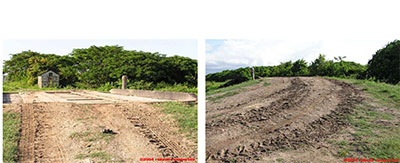Kowsilla – an ordinary woman who made an extraordinary sacrifice for her fellow humans
EVENTS would prove that the pandit chose an appropriate name for her – Kowsilla, whose namesake was Lord Rama’s mother, revered for upholding what Hindus call Dharm – a principled way of life and supporting her husband’s quest for discharging his duty and honouring his given word; even though it meant the banishment to the jungle of her beloved son and his gently-bred wife, Sita for fourteen years.

Kowsilla, also known as Alice, was involved in the sugar workers’ struggle for better working and living conditions and she paid the ultimate price for upholding her convictions and her principles.
On March 6th 1964 during an industrial strike at Plantation Leonora she and several other women stood resolutely, shoulder to shoulder, on a bridge and faced-off a PNC scab driving a tractor inexorably toward them under the direction of the colonial managers.

She, along with fourteen other sugar workers were mown down by the scab, Felix Ross. Kowsilla’s body was cut in two, while several other women were severely injured, with some being crippled for life. As Rakesh Rampersaud describes it, this was an extraordinary act by ordinary women; who nevertheless were agents of change in the labour movement, because their supreme sacrifice catalysed the recognition of the bargaining agent for sugar workers – The Man Power Citizens’ Association (MPCA) which, although it subsequently proved a disappointment for the sugar workers, because it later degenerated into a supporter of the oppressive PNC regime, paved the way for the emergence of the GAWU; but not without years-long, unrelenting struggle, spearheaded by Dr. Cheddi Jagan and the PPP, with the WPO giving optimum support to the cause.
It was this struggle that precipitated the strike of 1964 and culminated in the murder of Kowsilla. However the sacrifice of these indomitable women did not go in vain, because GAWU gained recognition by the Booker Tate sugar plantations in 1973.
Kowsilla lost her life, succumbing on her way to the Georgetown Hospital, and two other women – Jagdai and Daisy Sookram suffered broken spines, remaining crippled for the rest of their lives; while several other workers received severe injuries to various parts of their bodies. Some never recovered from those injuries, suffering one kind of disability or another, which precipitated their demise. Although they did not die directly from their injuries, their quality of live and lifespans were severely diminished, which was indirectly attributable to Felix Ross’s

murderous act, for which he was acquitted.
Kowsilla was born in 1920 in Seafield, Leonora, West Coast Demerara. Her parents were very poor and, although little is known of her married life, reports indicated that she became a single mother of four children whom she worked as a huckster to provide for.
She was enamoured by charismatic leader fighting for social and political change, Dr. Cheddi Jagan and became an activist for improving the lives of women in then British Guyana. She joined the Women’s Progressive Organisation (WPO), formed in 1953 by Mrs. Janet Jagan the wife of Dr. Cheddi Jagan, and became leader of the Leonora branch and executive member of the organization.

Kowsilla was forty-four years old when she paid the supreme price for her convictions on that fateful Friday morning on March 6th 1964. Along with her fellow workers she stood immovable, unheeding of the scab’s shouts as he continued to drive the tractor directly at them: “You-all ain’t hear what the Boss-man say? Get off the blasted bridge.” Before he ruthlessly ran them down.
An eyewitness recalled Kowsilla telling the other women “Don’t budge.We can’t let the rich man thief we children-them future ” before she fell, along with the others, scythed down in the prime of their lives like so much chaff by a murderous tool of evil men.
Of the fourteen who were mown down by the tractor, receiving serious injuries, two of them, Jagdai and Daisee Sookram suffered broken backs and were crippled for life. Another, Kisson Dai, lost one kidney and had broken hips.

the village end, or north
The unyielding stance of these ordinary workers heralded a sea change and a new dynamic in the labour movement, and the results of their sacrifices are today being enjoyed by all workers in the nation.
Yesterday, as the world observes International Day to Eliminate Violence Against Women 2014, the sacrifices of our female forebears need to be commemorated; especially the ultimate sacrifice by Kowsilla fifty years ago.
Last Sunday the WPO held a remembrance day activity at the Leonora Secondary School to reflect on the 50th death anniversary of Kowsilla.
(By Parvati Persaud-Edwards)



![28685488_782562395270301_8993561292501104985_n[1] 28685488_782562395270301_8993561292501104985_n[1]](https://guyana.crowdstack.io/fileSendAction/fcType/0/fcOid/577915707451341048/filePointer/577774969956776365/fodoid/577774969956776361/imageType/MEDIUM/inlineImage/true/28685488_782562395270301_8993561292501104985_n%255B1%255D.jpg)
![28685488_782562395270301_8993561292501104985_n[1] 28685488_782562395270301_8993561292501104985_n[1]](https://guyana.crowdstack.io/fileSendAction/fcType/0/fcOid/577915707451341048/filePointer/577774969956776365/fodoid/577774969956776361/imageType/SQUARE_THUMBNAIL/inlineImage/true/28685488_782562395270301_8993561292501104985_n%5B1%5D.jpg)
![28577502_782562448603629_5833810350041104197_n[1] 28577502_782562448603629_5833810350041104197_n[1]](https://guyana.crowdstack.io/fileSendAction/fcType/0/fcOid/577915707451341048/filePointer/577774969956787267/fodoid/577774969956787263/imageType/MEDIUM/inlineImage/true/28577502_782562448603629_5833810350041104197_n%255B1%255D.jpg)
![28577502_782562448603629_5833810350041104197_n[1] 28577502_782562448603629_5833810350041104197_n[1]](https://guyana.crowdstack.io/fileSendAction/fcType/0/fcOid/577915707451341048/filePointer/577774969956787267/fodoid/577774969956787263/imageType/SQUARE_THUMBNAIL/inlineImage/true/28577502_782562448603629_5833810350041104197_n%5B1%5D.jpg)
![28782640_782562141936993_9077849339241373637_n[1] 28782640_782562141936993_9077849339241373637_n[1]](https://guyana.crowdstack.io/fileSendAction/fcType/0/fcOid/577915707451341048/filePointer/577774969956889273/fodoid/577774969956889269/imageType/MEDIUM/inlineImage/true/28782640_782562141936993_9077849339241373637_n%255B1%255D.jpg)
![28782640_782562141936993_9077849339241373637_n[1] 28782640_782562141936993_9077849339241373637_n[1]](https://guyana.crowdstack.io/fileSendAction/fcType/0/fcOid/577915707451341048/filePointer/577774969956889273/fodoid/577774969956889269/imageType/SQUARE_THUMBNAIL/inlineImage/true/28782640_782562141936993_9077849339241373637_n%5B1%5D.jpg)